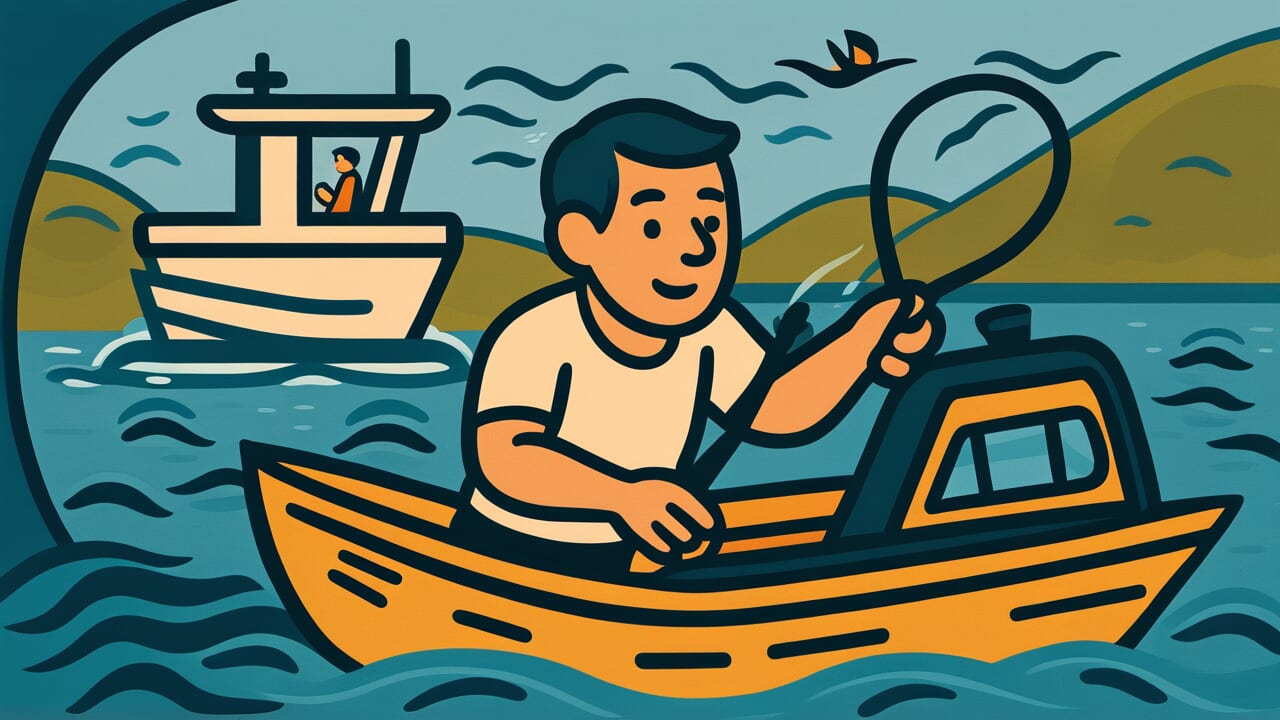How to Read “Renting an expensive boat to catch cheap small fish”
Takai fune karite yasui kozakana tsuru
Meaning of “Renting an expensive boat to catch cheap small fish”
“Renting an expensive boat to catch cheap small fish” is a proverb that describes situations where you spend too much money and get too little profit in return.
You pay a high price to rent a fancy boat, but all you catch are small fish with low market value. You’re clearly losing money.
This proverb criticizes situations in business and daily life where investment and results are badly out of balance.
For example, you buy expensive equipment but sales don’t increase. Or you rent a luxurious venue but few people attend.
This lesson remains very important in modern society. It warns against spending too much to show off or making big expenses without proper planning.
The proverb cautions against situations where your methods are excessive for your purpose. In other words, when your cost-effectiveness is poor.
Origin and Etymology
There are no clear records of when this proverb first appeared in written documents. However, we can guess how it came to be from its structure.
“Renting a boat” was part of both entertainment and livelihood for common people since the Edo period. To enjoy fishing, you naturally needed to pay a rental fee.
Renting an “expensive boat”—a fancy, large vessel—would cost even more money.
Meanwhile, “cheap small fish” refers to small fish with low market value. If you spend enough to rent a big boat but only catch worthless small fish, you clearly can’t break even.
This contrast forms the heart of the proverb.
The expression probably came from the actual experiences of fishermen and anglers. In the fishing world, the balance between investment and profit is a matter of survival.
Using expensive tools and boats without getting matching results could become both a joke and a warning.
This proverb is a crystallization of common people’s wisdom. It expresses the universal economic principle of cost-effectiveness through a concrete scene anyone can understand.
Usage Examples
- We spent millions on a new system but work efficiency barely improved. It’s like renting an expensive boat to catch cheap small fish.
- We booked a luxurious wedding venue but had few guests. It ended up being renting an expensive boat to catch cheap small fish.
Universal Wisdom
“Renting an expensive boat to catch cheap small fish” has been passed down through generations because it captures a universal human trait brilliantly.
That trait is our tendency to lose calm judgment when driven by vanity and expectations.
Everyone dreams of big results. When investing toward those dreams, we tend to think “fancy tools will bring fancy results.”
But reality doesn’t work that way. The fanciness of your tools and the size of your results don’t necessarily match.
In fact, investments beyond your means can become a burden that makes you suffer.
This proverb teaches about the gap between human desire and reality. We try to gain security by starting with appearances.
Acquiring expensive things makes us feel closer to success. But what truly matters isn’t the price of your tools.
It’s the skill and wisdom to use them well.
Our ancestors saw through this human weakness. The emptiness of showing off, the foolishness of unplanned investment, and above all, the danger of losing sight of balance between purpose and means.
This proverb is a life compass that reminds us across time to stay calm and humble.
When AI Hears This
The moment you rent an expensive boat, an interesting calculation begins in the human brain.
According to behavioral economics research, people cannot treat 10,000 yen already spent and 10,000 yen yet to be gained as equal values.
The 5,000 yen paid for boat rental is just the past that won’t return. Yet the brain records it as “a loss that must be recovered.”
Here’s a fascinating fact shown by prospect theory. Experiments prove that humans feel the pain of losing money about twice as strongly as the joy of gaining the same amount.
This means to fill the loss of 5,000 yen in boat rental, 2,500 yen worth of fish should logically be enough. But the brain demands 10,000 yen worth of results.
So even when you catch 300 yen worth of small fish, you feel “it’s not enough yet.” You keep investing more time and bait money.
Loss aversion psychology adds another blow. To avoid “complete loss” of returning with nothing, you tell yourself even cheap small fish are “better than zero.”
You should calmly compare the small fish’s value with additional costs. But the sunk cost of the initial boat rental keeps distorting your judgment.
This proverb points to a simple but difficult-to-execute truth. Human decisions should be based on future gains and losses, not the past.
Lessons for Today
This proverb teaches modern you the importance of finding “just right.” We tend to be captivated by good-looking things due to social media and media influence.
The latest tools, luxury brands, lavish presentations. But what you truly need is making appropriate choices that match your purpose.
When starting a business, do you need a fancy office from day one? When beginning a hobby, is professional-grade equipment essential?
In most cases, the answer is no. What matters is starting small, checking your results, and gradually increasing investment.
In modern society, “cost performance” is highly valued. This doesn’t simply mean choosing cheap things.
It means making the most rational choice in light of your purpose and budget.
When you’re about to start something, remember this proverb. Don’t get swept away by vanity or impatience. Think calmly about cost-effectiveness.
That attitude is the shortcut to long-term success. Starting with challenges that match your means is never shameful.
It’s a wise decision.



Comments